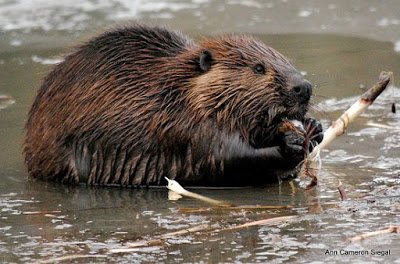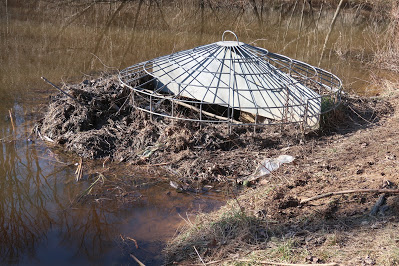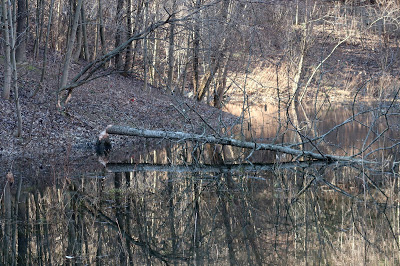Fairfax County has no plans to harm the Mantua beavers
 |
| A beaver in Huntley Meadows Park in Alexandria. |
“The county has no plans to trap, remove, or relocate the beavers at the Mantua pond,” said Fairfax County Wildlife Management Specialist Katherine Edwards.
That statement was made in response to a petition titled Save the Mantua Beavers by a Mantua resident concerned about a pair of beavers recently spotted in a stormwater retention pond near the Mantua Swim and Tennis Club in Fairfax.
 |
| Beavers deposited debris clogging the stormwater system in the Mantua pond. |
The petition says “the county has begun draining this pond and has plans to remove and kill these beavers within the week. The Virginia state policy is lethal removal unless there is a permit to relocate them.”
“It appears there is some misinformation being circulated,” Edwards said. “The county does not have any plans to remove or relocate beavers at this pond, nor did we previously.”
“As
they lowered the water level, two county workers told us they were draining the
pond specifically so the beavers could be trapped and removed,” said Mantua
resident Kimberly Zamuda. “Upon these concerning comments, the neighborhood and
county officials were informed of the situation. We are very glad the county
has no current plans to remove the beavers; though there is still concern of
what happens in the future.”
County wildlife staff are expected to visit the site to examine the extent of damages caused by the beavers, Edwards said, and determine “whether the county should start implementing non-lethal mitigation measures to minimize impacts on the property,” such as the tree guards and fencing.
“Beavers are a part of the natural ecosystem and serve as nature’s engineers in establishing and maintaining wetlands, which can provide beneficial habitat for numerous plant and animal species,” she said.
 |
| A beavers’ handiwork at the Mantua pond. |
But they can pose challenges for natural resource managers, especially in urban areas. Beavers can damage trees and alter hydrology by damming stormwater facilities, clogging irrigation ditches, and blocking culverts.
The beavers in the Mantua pond have blocked the control structure with branches and leaves, resulting in greatly expanding the footprint of the pond. They have also gnawed through several small tree trunks.
There are stormwater retention ponds in Fairfax County where there are beavers and they don’t impair the function of the facility, said Eric Caldwell, stormwater facility manager. In other ponds, beavers build dams that prevent water from exiting the facility.
 |
| The Mantua beavers’ home. |
“We then unblock the facility restoring functionality,” Caldwell said. “If beavers rebuild it, we will remove the dam again. Sometimes this is enough to deter the beaver and they relocate themselves to hopefully a more appropriate place. If not, we will build what is called a beaver deceiver fence.” That fence creates a much larger area to block, encouraging the beavers to move on.
Failing to address the problem could lead to significant sediment pollution, property damage, and the need for costly repairs.
“We don’t kill beavers,” Caldwell said. “Put even more simply, we could not take this action on a property that is not ours.”
Edwards does not have a population estimate for beavers in Fairfax County but says the animals are common throughout Virginia, including parks and stormwater ponds in Fairfax County.
“When there are conflicts with beavers, we follow a series of steps on county properties to coexist with beavers and minimize damage,” Edwards said. “These methods include landscape modification, exclusion measures, and/or humane harassment strategies to either coexist with beavers, deter them, or encourage them to move on their own if their presence cannot be tolerated and is impacting infrastructure.”
 |
| Trees gnawed by the Mantua beavers. |
Examples of these methods include wrapping trees with hardware cloth to prevent gnawing, installation of beaver baffles or pond levelers, culvert fencing, and breaking up the primary dam, she said.
“Population control is only used as a last resort in very rare situations when other methods have proven unsuccessful and impacts to the structure and function of a pond or property are extensive or pose a safety risk,” Edwards said.
Virginia regulations prohibit the relocation of wildlife, including beavers, she said, so this is not an option.
The state does permit the trapping and removal of beavers when conducted in accordance with regulations by the Virginia Department of Wildlife Resources. “However, since animals that are trapped cannot be moved and released onto another property,” Edwards said, “we exhaust all non-lethal options first in order to coexist with beavers and reduce property impacts before trapping would even be considered.”

Beautiful petition which made an impact
The ppl managing this country should know the ppl is watching them.
It is important to note also that two county officials specifically said that once the pond was drained, the beavers would be removed (and given the state regulations, they would have been killed). While the wildlife management specialist may not have been involved in this, for several days those on the ground had plans to remove the beavers. By involving the county and highlighting this issue, the right people got involved and fixed the situation.
I prefer the beavers over some of the crap that resides in Mason.
Well done Mantua! Please keep an eye on the beavers as I wouldn't trust FxCo to not remove them.
Amen to that!
I can never understand why some people freak out when they see wildlife. I love seeing animals in the wild. Makes for a great photo opportunity. Go take medicine if this makes you nervous.